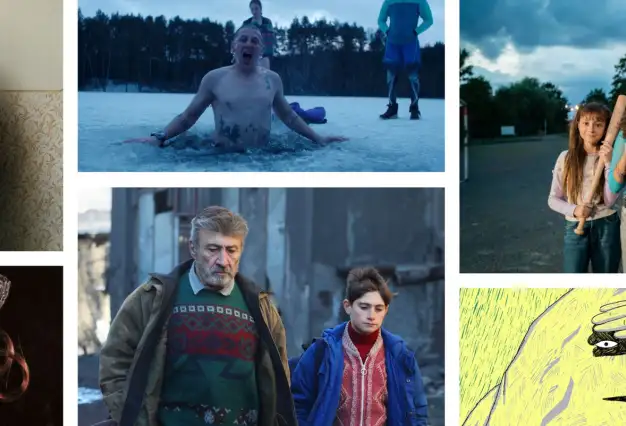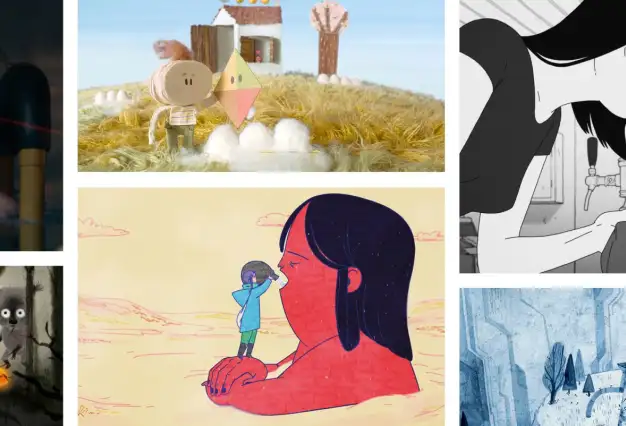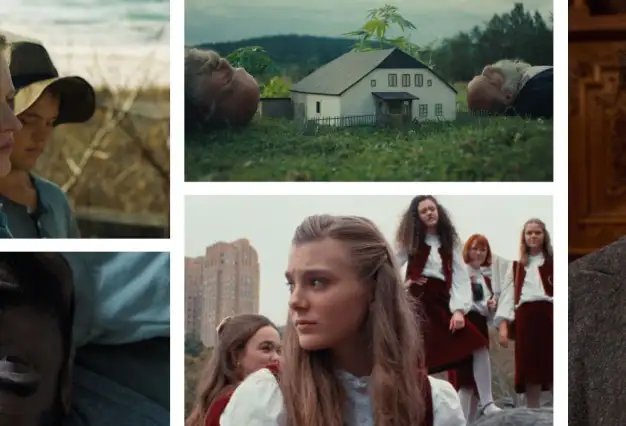
22 July 2025
Venice 2025: Auteur-driven slate marks Czech presence at Lido
Venice 2025: Auteur-driven slate marks Czech presence at Lido

At the 82nd Venice International Film Festival (August 27 – September 6, 2025), two films with Czech co-production ties will premiere in official selection. Tereza Nvotová’s Father debuts in the Orizzonti competition as a psychologically immersive drama unfolding in real time, based on a real-life tragedy that stirred national debate. In the Spotlight section, Stephan Komandarev presents Made in EU, a pandemic-era workplace drama examining labour exploitation in Bulgaria’s textile industry.
by Martin Kudláč
The Venice International Film Festival has welcomed Czech cinema over the course of past edition. While historically most Czech titles have appeared in Venice’s parallel strands, particularly Orizzonti, a section dedicated to formally ambitious and expressive works, recent years have seen a deepening presence across the festival’s major competitions, including Václav Marhoul´s The Painted Bird or Agnieszka Holland´s Green Border of which both have been selected for the main competition, immersive showcases, and high-profile co-productions. From politically urgent dramas and genre-fluid debuts to new media storytelling and restored classics, Czech participation at Venice has grown in both scale and diversity.
This increasing visibility reflects not only the vitality of the Czech domestic scene, but also its evolution into a collaborative hub for international production. Whether supporting auteur-driven features like Agnieszka Holland’s Green Border, spotlighting emerging talents in Orizzonti, or co-producing large-scale European series such as Thomas Vinterberg´s Families like Ours. Venice has also become a recurrent platform for rising Czech and Czech-based talent working across hybrid and innovative forms. Figures such as director Peter Kerekes (107 Mothers, Wishing on a Star), VR filmmaker Ondřej Moravec (Darkening, Fragile Home), and producer Marek Novák (Ordinary Failures, After Party) have returned to the Lido with projects that defy conventional boundaries, whether in the form of docu-fictions, mixed-reality installations, or psychological dramas disguised as thrillers.
A tragedy in real time

Following her Locarno-winning feature Nightsiren, Slovakia-born, Prague- and New York-based director Tereza Nvotová will premiere her latest work Father, in Venice´s Orizzonti competition. A Slovak-Czech-Polish co-production, the film is a psychologically immersive, formally rigorous drama based on a real-life case that sparked a national debate. Told entirely in long, single takes from a first-person perspective, Father reconstructs the aftermath of a tragedy in which a child dies after being left in an overheated car, an incident that tested the boundaries of public empathy, moral judgment, and personal responsibility.
Rather than following a traditional story arc, the film adopts a highly subjective approach. Real-time camera choreography, and a stripped-down mise-en-scène dissolve the distance between viewer and protagonist, immersing the audience in the disintegrating psyche of a man overwhelmed by grief, guilt, and social condemnation. “For me, the language of the film is just as important as the story. I couldn’t imagine telling this one in a conventional episodic structure—it would feel like flipping through a photo album from a funeral. No one wants to see that,” Nvotová revealed. “What I aimed for instead was something immersive, experiential—almost like a video game, but grounded in very different circumstances, ones that draw us deeper into ourselves. I wanted the audience to fully connect with the main character, to live his life without interruption or distance. The long takes give them no choice.”
Nvotová’s use of continuous takes and fragmented subjective perspective in Father echoes formally ambitious European films like Victoria and Son of Saul, which similarly explore psychological trauma through a first-person lens.


The film unites Nvotová with Polish cinematographer Adam Suzin, known for his work on the single-shot feature Hot and Cold. He was brought on to tackle the technical demands of shooting in extended takes. Producer Veronika Paštéková describes Father as “a true challenge,” emphasizing the level of technical precision and rehearsal required to maintain both authenticity and narrative fluidity. Nvotová worked closely on set with editor Nikodem Chabior (Wet Monday) who was brought onto the film primarily for his sense of rhythm and in-camera editing. The goal was to make decisions that would normally take place in the editing room directly on set. They were joined by production designer Nina Feriancová (Arved) and costumes designer Aneta Grňáková (Our Lovely Pig Slaughter).
Milan Ondrík (Restore Point) leads the cast as the titular father with Dominika Morávková (Filthy) portraying his wife alongside Aňa Geislerová (Caravan), Martin Sľuková (Watchmakerʼs Apprentice), or Peter Ondrejička (Nightsiren), Ingrid Timková (Let There Be Light), or Peter Bebjak (The Teacher).
Father is produced by Veronika Paštéková and Anton Škreko for DANAE Production (Slovakia), together with Karel Chvojka and Miloš Lochman of moloko film (Czech Republic), who has co-produced both Nvotová´s award-winning films Filthy and Nightsiren, and Marta Gmosińska and Mariusz Wlodarski from Lava Films (Poland), in co-production with Czech Television and TV JOJ. The film received production support from the Slovak Audiovisual Fund, the Czech Audiovisual Fund, and the Polish Film Institute. Distribution is confirmed with CinemArt for the Czech and Slovak territories on September 18.
The project was developed through major international co-production platforms, including When East Meets West and Baltic Event, where it generated early interest from sales agents and festival curators. It was later selected for Sofia Meetings and Black Nights Goes to Cannes at the Marché du Film in 2024, strengthening its position as a high-potential European art-house title.
Although Father is rooted in a single real-life incident, so-called “hot car deaths” are an increasingly global phenomenon, with an average of 38 child fatalities reported annually. Beyond the specific case, the film’s exploration of emotional accountability, the limits of social empathy, and the fragility of public perception gives it strong international resonance. Nvotová avoids overt didacticism, instead delving into the fraught space between private trauma and public judgment, offering a stark yet empathetic portrayal of a subject rarely addressed in mainstream cinema.
Stitching truth into crisis

The Bulgarian filmmaker Stephan Komandarev will premiere the final chapter in his informal “transition trilogy”, Made in EU, examining post-communist Bulgaria’s moral and economic transformation in the Spotlight section. Co-produced by Prague-based Negativ, the film marks another Czech contribution to socially resonant European cinema with international appeal.
Following Directions and Rounds, Komandarev, who won the Crystal Globe at the 57th edition of Karlovy Vary IFF for Blaga´s Lesson, once again delves into the moral and economic aftershocks of post-communist transformation, this time through the lens of the textile industry in pandemic-era Bulgaria. Set primarily in a rural garment workshop, the film centres on Iva, a 43-year-old seamstress who is falsely accused of spreading COVID-19. Forced to conceal her illness to keep her job, she becomes the scapegoat when an outbreak occurs, triggering a wave of blame and social ostracism. Through Iva’s story, the film interrogates the structural imbalance at the core of Europe’s single market, where profit often outweighs protection. Its attention to labour exploitation, regional disparity, and the human toll of economic policy places it in dialogue with a rising wave of socially engaged Central and Eastern European cinema.
Shot on location in southern Bulgaria (Haskovo, Dimitrovgrad, Rudozem, Madan) and Leipzig, the film combines realist textures with spatially layered compositions. Cinematographer Vesselin Hristov and screenwriter Simeon Ventsislavov, long-time collaborators of Komandarev, adopt a visual strategy rooted in realism, employing the 3:2 format and composed, spatially layered frames. The film stars Gergana Pletnyova (No One), Todor Kotsev (Gundi: Legend of Love), Ivan Barnev (I Served the King of England), Ivaylo Hristov (Memoir of a Betrayal), Anastasia Ingilizova (Viktoria), alongside non-professional actors recruited from local communities, echoing the hybrid casting approach of Komandarev’s Blaga’s Lessons.
Czech company Negativ, under producer Pavel Strnad, has been a backer of committed international auteur cinema, with recent credits including Mihal Brezis and Oded Binnun´s Dead Language, Guðmundur Arnar Guðmundsson´s Beautiful Beings, Christian Schwochow´s Je Suis Karl or Ivan Ostrochovský´s Servants among others. For Made in EU, Negativ contributed both to the creative development and post-production phases of the project. The sound design and final mix were completed in the Czech Republic by Martin Jílek of Soundsquare.
Made in EU is produced by Komandarev and Katya Trichkova from Argo Film (Bulgaria), in co-production with Christoph Kukula and Eike Goreczka of 42film (Germany) and Pavel Strnad of Negativ (Czech Republic). The film was supported by the Bulgarian National Film Center, Mitteldeutsche Medienförderung and the Czech Audiovisual Fund. Further co-producers include Bulgarian National Television, ZDF/Arte and TRT Sinema. The project was selected for L’Atelier de la Cinéfondation at Cannes in 2022 and won Best Project at Arras Days 2023, generating early interest among European distributors and broadcasters.






